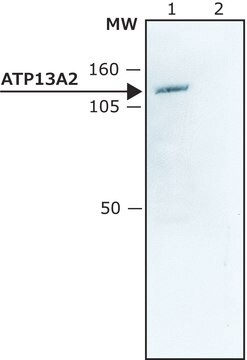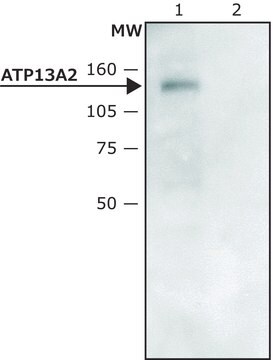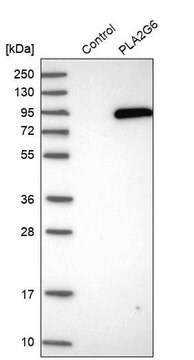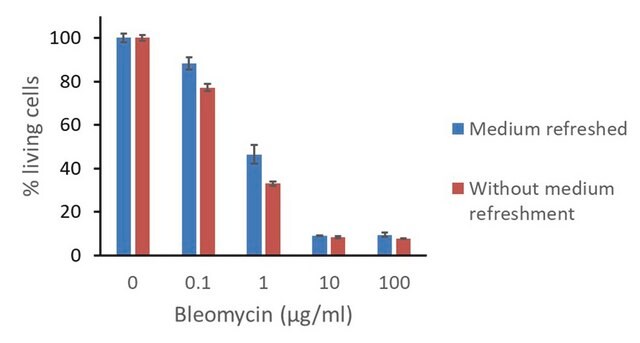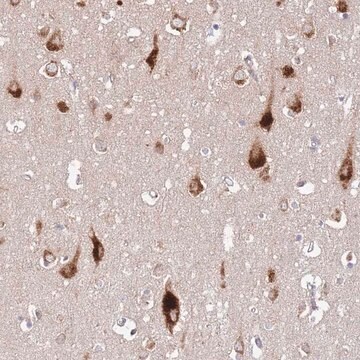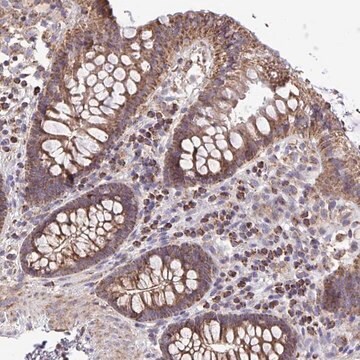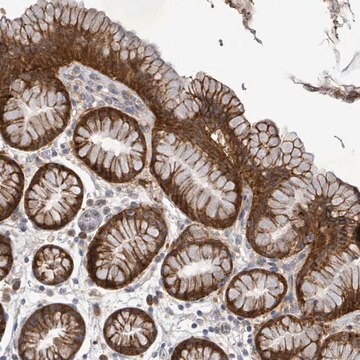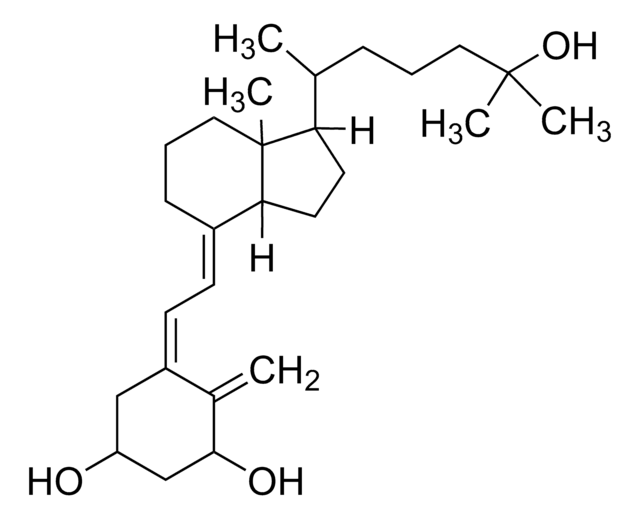추천 제품
생물학적 소스
rabbit
결합
unconjugated
항체 형태
affinity isolated antibody
항체 생산 유형
primary antibodies
클론
polyclonal
양식
buffered aqueous solution
분자량
antigen ~129 kDa
종 반응성
mouse, human
향상된 검증
recombinant expression
Learn more about Antibody Enhanced Validation
농도
~1 mg/mL
기술
western blot: 1-2 μg/mL using mouse brain extract (S1 fraction)
western blot: 2-4 μg/mL using extract of HEk-293T cells expressing human ATP13A2
배송 상태
dry ice
저장 온도
−20°C
타겟 번역 후 변형
unmodified
유전자 정보
human ... ATP13A2(23400)
mouse ... Atp13a2(74772)
rat ... Atp13a2(362645)
일반 설명
ATP13A2 is a member of the P5 family of ATPases which function in the transport of inorganic cations.
ATPase type 13A2 (ATP13A2) is a neuronal P-type ATPAse. The gene is also referref as PARK9 (Parkinson′s disease 9).
Rabbit Anti-ATP13A2 antibody binds to human and mouse ATP13A2.
애플리케이션
Rabbit Anti-ATP13A2 antibody has been used for western blot assays.
생화학적/생리학적 작용
Mutations in the gene encoding ATPase type 13A2 (ATP13A2) is implicated with a hereditary form of PD associated with dementia, known as Kufor-Rakeb syndrome (KRS). ATP13A2 shows elevated expression levels in brains of sporadic PD patients, suggesting a potential role in the more common forms of Parkinson′s disease.
물리적 형태
Solution in 0.01 M phosphate buffered saline, pH 7.4, containing 15 mM sodium azide.
면책조항
Unless otherwise stated in our catalog or other company documentation accompanying the product(s), our products are intended for research use only and are not to be used for any other purpose, which includes but is not limited to, unauthorized commercial uses, in vitro diagnostic uses, ex vivo or in vivo therapeutic uses or any type of consumption or application to humans or animals.
적합한 제품을 찾을 수 없으신가요?
당사의 제품 선택기 도구.을(를) 시도해 보세요.
Storage Class Code
10 - Combustible liquids
Flash Point (°F)
Not applicable
Flash Point (°C)
Not applicable
개인 보호 장비
Eyeshields, Gloves, multi-purpose combination respirator cartridge (US)
가장 최신 버전 중 하나를 선택하세요:
Hereditary parkinsonism with dementia is caused by mutations in ATP13A2, encoding a lysosomal type 5 P-type ATPase
Ramirez A, et al.
Nature Genetics, 38(10), 1184-1184 (2006)
Patrick J Schultheis et al.
Human molecular genetics, 22(10), 2067-2082 (2013-02-09)
Mutations in ATP13A2 (PARK9), encoding a lysosomal P-type ATPase, are associated with both Kufor-Rakeb syndrome (KRS) and neuronal ceroid lipofuscinosis (NCL). KRS has recently been classified as a rare genetic form of Parkinson's disease (PD), whereas NCL is a lysosomal
Yuta Hatori et al.
PloS one, 17(11), e0276823-e0276823 (2022-11-30)
Mutations in ATP13A2 cause Kufor-Rakeb Syndrome (KRS), a juvenile form of Parkinson's Disease (PD). The gene product belongs to a diverse family of ion pumps and mediates polyamine influx from lysosomal lumen. While the biochemical and structural studies highlight its
Jason P Covy et al.
Journal of neuroscience research, 90(12), 2306-2316 (2012-08-01)
Mutations in ATP13A2, which encodes a lysosomal P-type ATPase of unknown function, cause an autosomal recessive parkinsonian syndrome. With mammalian cells, we show that ATP13A2 expression protects against manganese and nickel toxicity, in addition to proteasomal, mitochondrial, and oxidative stress.
자사의 과학자팀은 생명 과학, 재료 과학, 화학 합성, 크로마토그래피, 분석 및 기타 많은 영역을 포함한 모든 과학 분야에 경험이 있습니다..
고객지원팀으로 연락바랍니다.
